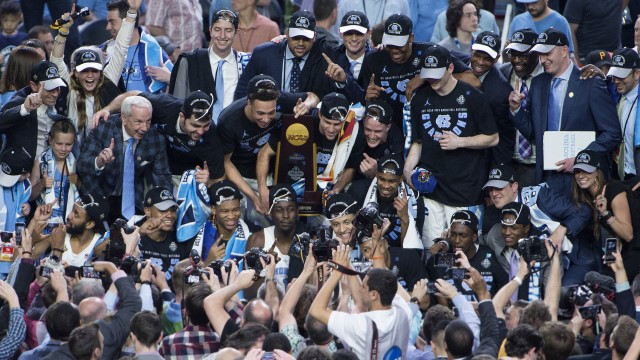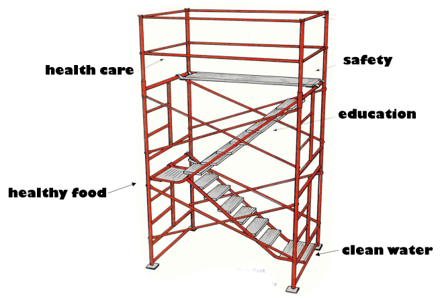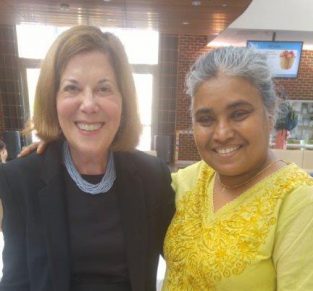Related Posts

Photo by Jeffrey A. Camarati (goheels.com). Surrounded by fans, the UNC Tar Heels celebrated with the NCAA championship trophy. Players tied strings from the net to their caps.
In the spirit of public health week, we offer a shout out for both basketball nets and safety nets.

Photo by Bob Donnan, USA Today. After the championship game, Joel Berry II, who was named Most Outstanding Player of the 2017 NCAA Tournament, snipped a piece of the net from the hoop in University of Phoenix Stadium.
We love basketball in Chapel Hill. I love it! There’s nothing more exhilarating than watching the winning players make their ascent and take the game net apart, piece by piece. Despite the ups and downs of the championship game with Gonzaga Monday night, our Carolina team played hard and well – and won 71-65. They deserved their trophy and lots of adulation. (View two-minute highlight video here.)
But there’s another type of net that should never be cut – the safety net that protects the most vulnerable of us. It’s bad for everyone and tragic for some when this safety net – which gives a hand up and not a handout – is dismantled.
There has been a lot of talk about which programs in our federal budget would be cut to pay for a border wall and dramatically increase military support. Those programs could comprise much of the safety net that gives a hand up to people in need – from families who can’t pay their energy bills (and could die from cold exposure in winter and heat in summer), to early childhood education to meals for older people to the millions of children and adults who no longer would have health insurance and for whom Medicaid access would be restricted dramatically.
A hand up – not a handout – to people who need it doesn’t just help the recipient. It helps us all. For example, hospitals in this country lose billions of dollars every year because of uncompensated care. The number would be even larger were it not for publicly funded programs, such as Medicaid and insurance provided through health insurance exchanges, which cover some of the costs of care for those who otherwise would have none and who appear in hospitals’ emergency rooms – the health care setting of last resort for many. Early childhood education programs not only aid children who have not been advantaged to catch up with those who have been – the effects last well beyond early childhood to preventing dropouts and improving a variety of health indicators. That results in cost savings for all.
Dr. Ruth Katz, a physician and former dean and faculty member of the George Washington University Milken Institute School of Public Health, wrote a column last week in STAT (a source I really appreciate, including its daily newsletter, Morning Rounds). “Public health efforts appear headed for the chopping block under the Trump administration’s recently released budget,” said Katz, who is now executive director of the Aspen Institute’s Health, Medicine and Society Program. “That’s a threat to national security. A warning to the president and Congress: A nation cannot be great if it isn’t healthy. Public health, that often-invisible science that promotes the well-being of families and communities, is a bulwark of strong defense. We need the hard power of health to keep Americans safe.”
Thanking public health workers
There are no championships in public health. It’s hard work that dedicated, generally underpaid people do every day. Public health too often is forgotten – because the good public health workers do frequently is unseen. The people who protect us from unsafe water and food, prevent disease outbreaks and track them down when they occur, provide immunizations, prevent obesity, diabetes, hypertension and so much more often go without being thanked.
 This is the week to thank them and recognize them as the champions they are! It also is a chance to remind us all that good health and safety don’t just happen. They must be supported as essential infrastructure, the scaffolding for good health. For the long-term health and well-being of the United States, investing in that scaffolding would make much more sense than spending millions and millions to build a wall designed to keep people out.
This is the week to thank them and recognize them as the champions they are! It also is a chance to remind us all that good health and safety don’t just happen. They must be supported as essential infrastructure, the scaffolding for good health. For the long-term health and well-being of the United States, investing in that scaffolding would make much more sense than spending millions and millions to build a wall designed to keep people out.
Students, faculty and staff members, alumni and community partners of the Gillings School are celebrating National Public Health Week through Sunday, April 9. National Public Health Week focuses on the power of prevention and policies that make all people healthier.
Activities planned by our School’s North Carolina Institute for Public Health (NCIPH) and student organizations highlight many important themes and priorities, including:
- Safe drinking water
- Voting rights
- Community-based service projects
- Nutrition and hunger
- Mental health
- Fitness through walking, yoga, recreation and more
On Thursday, we will present the Public Health Champion Award to Vimala Rajendran, owner of Vimala’s Curryblossom Café in Chapel Hill. Vimala is a remarkable woman with a devotion not just to local, healthy food but also to social justice and people in need. She routinely gives a hand up to people who need it. (Read more about her here.)
Barbara

